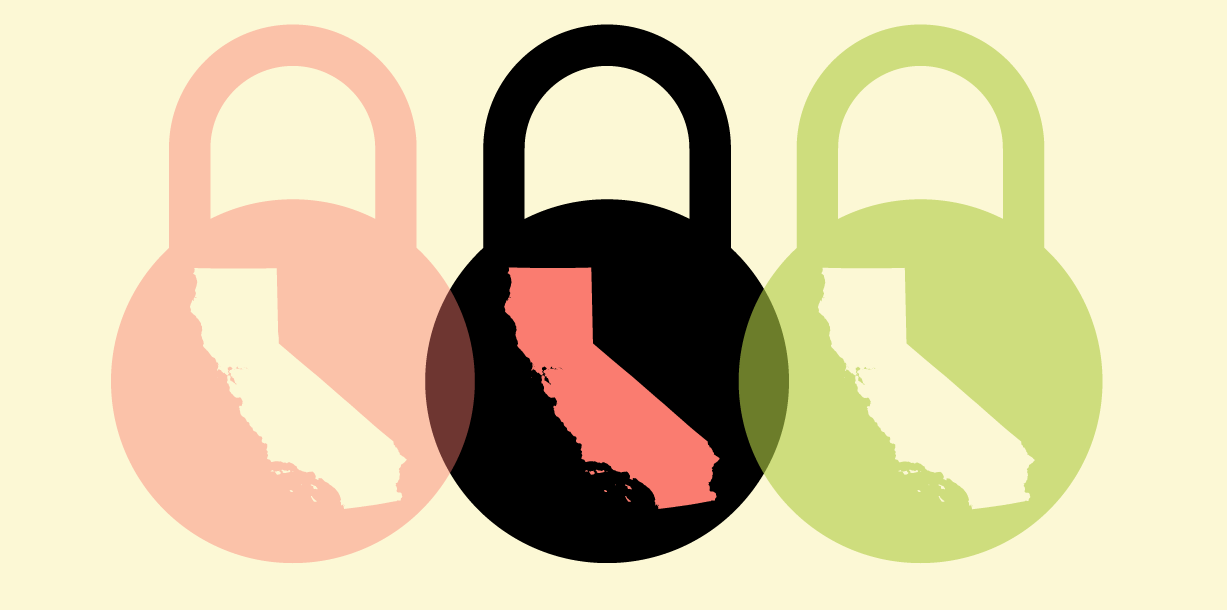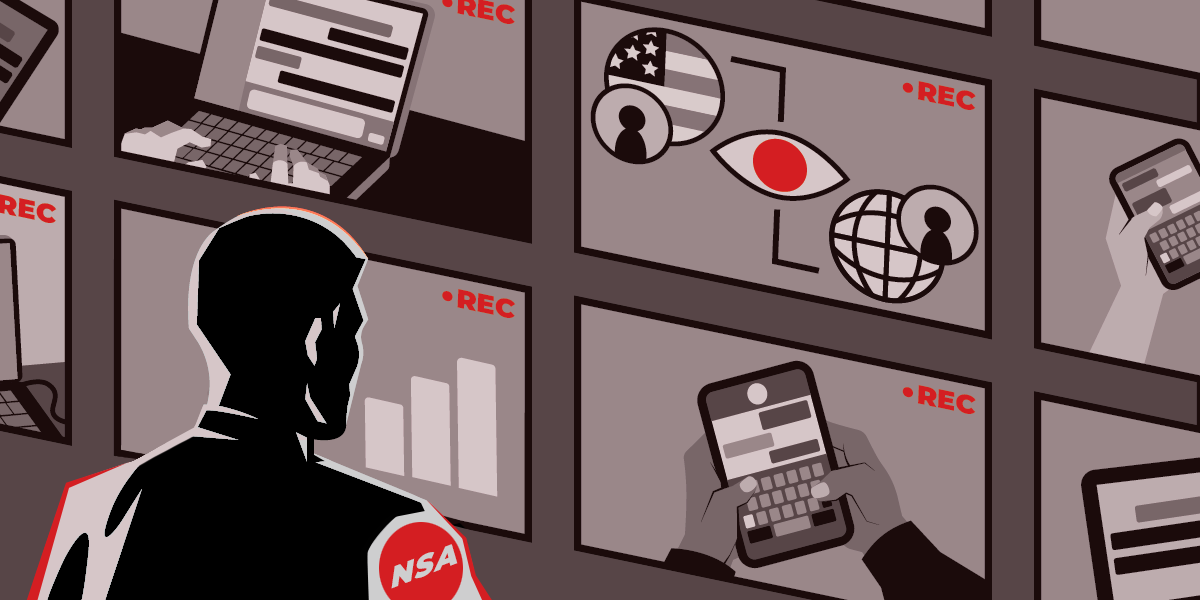Recognizing the worst in government transparency.
The Foilies are co-written by EFF and MuckRock and published in alternative newspapers around the country through a partnership with the Association of Alternative Newsmedia.
We're taught in school about checks and balances between the various branches of government, but those lessons tend to leave out the role that civilians play in holding officials accountable. We're not just talking about the ballot box, but the everyday power we all have to demand government agencies make their records and data available to public scrutiny.
At every level of government in the United States (and often in other countries), there are laws that empower the public to file requests for public records. They go by various names—Freedom of Information, Right-to-Know, Open Records, or even Sunshine laws—but all share the general concept that because the government is of the people, its documents belong to the people. You don't need to be a lawyer or journalist to file these; you just have to care.
It's easy to feel powerless in these times, as local newsrooms close, and elected officials embrace disinformation as a standard political tool. But here's what you can do, and we promise it'll make you feel better: Pick a local agency—it could be a city council, a sheriff's office or state department of natural resources—and send them an email demanding their public record-request log, or any other record showing what requests they receive, how long it took them to respond, whether they turned over records, and how much they charged the requester for copies. Many agencies even have an online portal that makes it easier, or you can use MuckRock’s records request tool. (You can also explore other people's results that have been published on MuckRock's FOIA Log Explorer.) That will send the message to local leaders they're on notice. You may even uncover an egregious pattern of ignoring or willfully violating the law.
The Foilies are our attempt to call out these violations each year during Sunshine Week, an annual event (March 10-16 this year) when advocacy groups, news organizations and citizen watchdogs combine efforts to highlight the importance of government transparency laws. The Electronic Frontier Foundation and MuckRock, in partnership with the Association of Alternative Newsmedia, compile the year's worst and most ridiculous responses to public records requests and other attempts to thwart public access to information, including through increasing attempts to gut the laws guaranteeing this access—and we issue these agencies and officials tongue-in-cheek "awards" for their failures.
Sometimes, these awards actually make a difference. Last year, Mendocino County in California repealed its policy of charging illegal public records fees after local journalists and activists used The Foilies’ "The Transparency Tax Award" in their advocacy against the rule.
This year marks our 10th annual accounting of ridiculous redactions, outrageous copying fees, and retaliatory attacks on requesters—and we have some doozies for the ages.
The "Winners"
The Not-So-Magic Word Award: Augusta County Sheriff’s Office, Va.
Public records laws exist in no small part because corruption, inefficiency and other malfeasance happen, regardless of the size of the government. The public’s right to hold these entities accountable through transparency can prevent waste and fraud.
Of course, this kind of oversight can be very inconvenient to those who would like a bit of secrecy. Employees in Virginia’s Augusta County thought they’d found a neat trick for foiling Virginia's Freedom of Information Act.
Consider: “NO FOIA”
In an attempt to withhold a bunch of emails they wanted to hide from the public eye, employees in Augusta County began tagging their messages with “NO FOIA,” as an apparent incantation staff believed could ward off transparency. Of course, there are no magical words that allow officials to evade transparency laws; the laws assume all government records are public, so agencies can’t just say they don’t want records released.
Fortunately, at least one county employee thought that breaking the law must be a little more complicated than that, and this person went to Breaking Through News to blow the whistle.
Breaking Through News sent a FOIA request for those “NO FOIA” emails. The outlet received just 140 emails of the 1,212 that the county indicated were responsive, and those released records highlighted the county’s highly suspect approach to withholding public records. Among the released records were materials like the wages for the Sheriff Office employees (clearly a public record), the overtime rates (clearly a public record) and a letter from the sheriff deriding the competitive wages being offered at other county departments (embarrassing but still clearly a public record).
Other clearly public records, according to a local court, included recordings of executive sessions that the commissioners had entered illegally, which Breaking Through News learned about through the released records. They teamed up with the Augusta Free Press to sue for access to the recordings, a suit they won last month. They still haven’t received the awarded records, and it’s possible that Augusta County will appeal. Still, it turned out that, thanks to the efforts of local journalists, their misguided attempt to conjure a culture of “No FOIA” in August County actually brought them more scrutiny and accountability.
The Poop and Pasta Award: Richlands, Va.
Government officials retaliated against a public records requester by filling her mailbox with noodles.
In 2020, Laura Mollo of Richlands, Va., discovered that the county 911 center could not dispatch Richlands residents’ emergency calls: While the center dispatched all other county 911 calls, calls from Richlands had to be transferred to the Richlands Police Department to be handled. After the Richlands Town Council dismissed Mollo’s concerns, she began requesting records under the Virginia Freedom of Information Act. The records showed that Richlands residents faced lengthy delays in connecting with local emergency services. On one call, a woman pleaded for help for her husband, only to be told that county dispatch couldn’t do anything—and her husband died during the delay. Other records Mollo obtained showed that Richlands appeared to be misusing its resources.
You would hope that public officials would be grateful that Mollo uncovered the town’s inadequate emergency response system and budget mismanagement. Well, not exactly: Mollo endured a campaign of intimidation and harassment for holding the government accountable. Mollo describes how her mailbox was stuffed with cow manure on one occasion, and spaghetti on another (which Mollo understood to be an insult to her husband’s Italian heritage). A town contractor harassed her at her home; police pulled her over; and Richlands officials even had a special prosecutor investigate her.
But this story has a happy ending: In November 2022, Mollo was elected to the Richlands Town Council. The records she uncovered led Richlands to change over to the county 911 center, which now dispatches Richlands residents’ calls. And in 2023, the Virginia Coalition for Open Government recognized Mollo by awarding her the Laurence E. Richardson Citizen Award for Open Government. Mollo’s recognition is well-deserved. Our communities are indebted to people like her who vindicate our right to public records, especially when they face such inexcusable harassment for their efforts.
The Error 404 Transparency Not Found Award: FOIAonline
In 2012, FOIAonline was launched with much fanfare as a way to bring federal transparency into the late 20th century. No longer would requesters have to mail or fax requests. Instead, FOIAonline was a consolidated starting point, managed by the Environmental Protection Agency (EPA), that let you file Freedom of Information Act requests with numerous federal entities from within a single digital interface.
Even better, the results of requests would be available online, meaning that if someone else asked for interesting information, it would be available to everyone, potentially reducing the number of duplicate requests. It was a good idea—but it was marred from the beginning by uneven uptake, agency infighting, and inscrutable design decisions that created endless headaches. In its latter years, FOIAonline would go down for days or weeks at a time without explanation. The portal saw agency after agency ditch the platform in favor of either homegrown solutions or third-party vendors.
Last year, the EPA announced that the grand experiment was being shuttered, leaving thousands of requesters uncertain about how and where to follow up on their open requests, and unceremoniously deleting millions of documents from public access without any indication of whether they would be made available again.
In a very on-brand twist of the knife, the decision to sunset FOIAonline was actually made two years prior, after an EPA office reported in a presentation that the service was likely to enter a “financial death spiral” of rising costs and reduced agency usage. Meanwhile, civil-society organizations such as MuckRock, the Project on Government Oversight, and the Internet Archive have worked to resuscitate and make available at least some of the documents the site used to host.
The Literary Judicial Thrashing of the Year Award: Pennridge, Penn., School District
Sometimes when you're caught breaking the law, the judge will throw the book at you. In the case of Pennridge School District in Bucks County, Penn. Judge Jordan B. Yeager catapulted an entire shelf of banned books at administrators for violating the state's Right-to-Know Law.
The case begins with Darren Laustsen, a local parent who was alarmed by a new policy to restrict access to books that deal with “sexualized content,” seemingly in lockstep with book-censorship laws happening around the country. Searching the school library's catalog, he came across a strange trend: Certain controversial books that appeared on other challenged-book lists had been checked out for a year or more. Since students are only allowed to check out books for a week, he (correctly) suspected that library staff were checking them out themselves to block access.
So he filed a public records request for all books checked out by non-students. Now, it's generally important for library patrons to have their privacy protected when it comes to the books they read—but it's a different story if public employees are checking out books as part of their official duties and effectively enabling censorship. The district withheld the records, provided incomplete information, and even went so far as to return books and re-check them out under a student's account in order to obscure the truth. And so Laustsen sued.
The judge issued a scathing and literarily robust ruling: “In short, the district altered the records that were the subject of the request, thwarted public access to public information, and effectuated a cover-up of faculty, administrators, and other non-students’ removal of books from Pennridge High School’s library shelves." The opinion was peppered with witty quotes from historically banned books, including Nineteen Eighty-Four, Alice in Wonderland, The Art of Racing in the Rain and To Kill a Mockingbird. After enumerating the district's claims that later proved to be inaccurate, he cited Kurt Vonnegut's infamous catchphrase from Slaughterhouse-Five: "So it goes."
The Photographic Recall Award: Los Angeles Police Department
Police agencies seem to love nothing more than trumpeting an arrest with an accompanying mugshot—but when the tables are turned, and it’s the cops’ headshots being disclosed, they seem to lose their minds and all sense of the First Amendment.
This unconstitutional escapade began (and is still going) after a reporter and police watchdog published headshots of Los Angeles Police Department officers, which they lawfully obtained via a public records lawsuit. LAPD cops and their union were furious. The city then sued the reporter, Ben Camacho, and the Stop LAPD Spying Coalition, demanding that they remove the headshots from the internet and return the records to LAPD.
You read that right: After a settlement in a public records lawsuit required the city to disclose the headshots, officials turned around and sued the requester for, uh, disclosing those same records, because the city claimed it accidentally released pictures of undercover cops.
But it gets worse: Last fall, a trial court denied a motion to throw out the city’s case seeking to claw back the images; Camacho and the coalition have appealed that decision and have not taken the images offline. And in February, the LAPD sought to hold Camacho and the coalition liable for damages it may face in a separate lawsuit brought against it by hundreds of police officers whose headshots were disclosed.
We’re short on space, but we’ll try explain the myriad ways in which all of the above is flagrantly unconstitutional: The First Amendment protects Camacho and the coalition’s ability to publish public records they lawfully obtained, prohibits courts from entering prior restraints that stop protected speech, and limits the LAPD’s ability to make them pay for any mistakes the city made in disclosing the headshots. Los Angeles officials should be ashamed of themselves—but their conduct shows that they apparently have no shame.
The Cops Anonymous Award: Chesterfield County Police Department, Va.
The Chesterfield County Police Department in Virginia refused to disclose the names of hundreds of police officers to a public records requester on this theory: Because the cops might at some point go undercover, the public could never learn their identities. It’s not at all dystopian to claim that a public law enforcement agency needs to have secret police!
Other police agencies throughout the state seem to deploy similar secrecy tactics, too.
The Keep Your Opinions to Yourself Award: Indiana Attorney General Todd Rokita
In March 2023, Indiana Attorney General Todd Rokita sent a letter to medical providers across the state demanding information about the types of gender-affirming care they may provide to young Hoosiers. But this was no unbiased probe: Rokita made his position very clear when he publicly blasted these health services as “the sterilization of vulnerable children” that “could legitimately be considered child abuse.” He made claims to the media that the clinics’ main goals weren’t to support vulnerable youth, but to rake in cash.
Yet as loud as he was about his views in the press, Rokita was suddenly tight-lipped once the nonprofit organization American Oversight filed a public records request asking for all the research, analyses and other documentation that he used to support his claims. Although his agency located 85 documents that were relevant to their request, Rokita refused to release a single page, citing a legal exception that allows him to withhold deliberative documents that are “expressions of opinion or are of a speculative nature.”
Perhaps if Rokita’s opinions on gender-affirming care weren't based on facts, he should've kept those opinions and speculations to himself in the first place.
The Failed Sunshine State Award: Florida Gov. Ron DeSantis
Florida’s Sunshine Law is known as one of the strongest in the nation, but Gov. Ron DeSantis spent much of 2023 working, pretty successfully, to undermine its superlative status with a slew of bills designed to weaken public transparency and journalism.
In March, DeSantis was happy to sign a bill to withhold all records related to travel done by the governor and a whole cast of characters. The law went into effect just more than a week before the governor announced his presidential bid. In addition, DeSantis has asserted his “executive privilege” to block the release of public records in a move that, according to experts like media law professor Catherine Cameron, is unprecedented in Florida’s history of transparency.
DeSantis suspended his presidential campaign in January. That may affect how many trips he’ll be taking out-of-state in the coming months, but it won’t undo the damage of his Sunshine-slashing policies.
Multiple active lawsuits are challenging DeSantis over his handling of Sunshine Law requests. In one, The Washington Post is challenging the constitutionality of withholding the governor’s travel records. In that case, a Florida Department of Law Enforcement official last month claimed the governor had delayed the release of his travel records. Nonprofit watchdog group American Oversight filed a lawsuit in February, challenging “the unjustified and unlawful delay” in responding to requests, citing a dozen records requests to the governor’s office that have been pending for one to three years.
“It’s stunning, the amount of material that has been taken off the table from a state that many have considered to be the most transparent,” Michael Barfield, director of public access for the Florida Center for Government Accountability (FCGA), told NBC News. The FCGA is now suing the governor’s office for records on flights of migrants to Massachusetts. “We’ve quickly become one of the least transparent in the space of four years.”
The Self-Serving Special Session Award: Arkansas Gov. Sarah Huckabee Sanders
By design, FOIA laws exist to help the people who pay taxes hold the people who spend those taxes accountable. In Arkansas, as in many states, taxpayer money funds most government functions: daily office operations, schools, travel, dinners, security, etc. As Arkansas’ governor, Sarah Huckabee Sanders has flown all over the country, accompanied by members of her family and the Arkansas State Police. For the ASP alone, the people of Arkansas paid $1.4 million in the last half of last year.
Last year, Sanders seemed to tire of the scrutiny being paid to her office and her spending. Sanders cited her family’s safety as she tried to shutter any attempts to see her travel records, taking the unusual step of calling a special session of the state Legislature to protect herself from the menace of transparency.
Notably, the governor had also recently been implicated in an Arkansas Freedom of Information Act case for these kinds of records.
The attempt to gut the law included a laundry list of carve-outs unrelated to safety, such as walking back the ability of public-records plaintiffs to recover attorney's fees when they win their case. Other attempts to scale back Arkansas' FOIA earlier in the year had not passed, and the state attorney general’s office was already working to study what improvements could be made to the law.
Fortunately, the people of Arkansas came out to support the principle of government transparency, even as their governor decided she shouldn’t need to deal with it anymore. Over a tense few days, dozens of Arkansans lined up to testify in defense of the state FOIA and the value of holding elected officials, like Sanders, accountable to the people.
By the time the session wound down, the state Legislature had gone through multiple revisions. The sponsors walked back most of the extreme asks and added a requirement for the Arkansas State Police to provide quarterly reports on some of the governor’s travel costs. However, other details of that travel, like companions and the size of the security team, ultimately became exempt. Sanders managed to twist the whole fiasco into a win, though it would be a great surprise if the Legislature didn’t reconvene this year with some fresh attempts to take a bite out of FOIA.
While such a blatant attempt to bash public transparency is certainly a loser move, it clearly earns Sanders a win in the FOILIES—and the distinction of being one of the least transparent government officials this year.
The Doobie-ous Redaction Award: U.S. Department of Health and Human Services and Drug Enforcement Administration
The feds heavily redacted an email about reclassifying cannabis from a Schedule I to a Schedule III substance.
Bloomberg reporters got a major scoop when they wrote about a Health and Human Services memo detailing how health officials were considering major changes to the federal restrictions on marijuana, recommending reclassifying it from a Schedule I substance to Schedule III.
Currently, the Schedule I classification for marijuana puts it in the same league as heroin and LSD, while Schedule III classification would indicate lower potential for harm and addiction along with valid medical applications.
Since Bloomberg viewed but didn’t publish the memo itself, reporters from the Cannabis Business Times filed a FOIA request to get the document into the public record. Their request was met with limited success: HHS provided a copy of the letter, but redacted virtually the entire document besides the salutation and contact information. When pressed further by CBT reporters, the DEA and HHS would only confirm what the redacted documents had already revealed—virtually nothing.
HHS handed over the full, 250-page review several months later, after a lawsuit was filed by an attorney in Texas. The crucial information the agencies had fought so hard to protect: “Based on my review of the evidence and the FDA’s recommendation, it is my recommendation as the Assistant Secretary for Health that marijuana should be placed in Schedule III of the CSA.”
The “Clearly Releasable,” Clearly Nonsense Award: U.S. Air Force
Increasingly, federal and state government agencies require public records requesters to submit their requests through online portals. It’s not uncommon for these portals to be quite lacking. For example, some portals fail to provide space to include information crucial to requests.
But the Air Force deserves special recognition for the changes it made to its submission portal, which asked requesters if they would agree to limit their requests to information that the Air Force deemed "clearly releasable.” You might think, “surely the Air Force defined this vague ‘clearly releasable’ information.” Alas, you’d be wrong: The form stated only that requesters would “agree to accept any information that will be withheld in compliance with the principles of FOIA exemptions as a full release.” In other words, the Air Force asked requesters to give up the fight over information before it even began, and to accept the Air Force's redactions and rejections as non-negotiable.
Following criticism, the Air Force jettisoned the update to its portal to undo these changes. Moving forward, it's "clear" that it should aim higher when it comes to transparency.
The Scrubbed Scrubs Award: Ontario Ministry of Health, Canada
Upon taking office in 2018, Ontario Premier Doug Ford was determined to shake up the Canadian province’s healthcare system. His administration has been a bit more tight-lipped, however, about the results of that invasive procedure. Under Ford, Ontario’s Ministry of Health is fighting the release of information on how understaffed the province’s medical system is, citing “economic and other interests.” The government’s own report, partially released to Global News, details high attrition as well as “chronic shortages” of nurses.
The reporters’ attempts to find out exactly how understaffed the system is, however, were met with black-bar redactions. The government claims that releasing the information would negatively impact “negotiating contracts with health-care workers.” However, the refusal to release the information hasn’t helped solve the problem; instead, it’s left the public in the dark about the extent of the issue and what it would actually cost to address it.
Global News has appealed the withholdings. That process has dragged on for over a year, but a decision is expected soon.
The Judicial Blindfold Award: Mississippi Justice Courts
Courts are usually transparent by default. People can walk in to watch hearings and trials, and can get access to court records online or at the court clerk’s office. And there are often court rules or state laws that ensure courts are public.
Apparently, the majority of Mississippi Justice Courts don’t feel like following those rules. An investigation by ProPublica and the Northeast Mississippi Daily Journal found that nearly two-thirds of these county-level courts obstructed public access to basic information about law enforcement’s execution of search warrants. This blockade not only appeared to violate state rules on court access; it frustrated the public’s ability to scrutinize when police officers raid someone’s home without knocking and announcing themselves.
The good news is that the Daily Journal is pushing back. It filed suit in the justice court in Union County, Miss., and asked for an end to the practice of never making search-warrant materials public.
Mississippi courts are unfortunately not alone in their efforts to keep search warrant records secret. The San Bernardino Superior Court of California sought to keep secret search warrants used to engage in invasive digital surveillance, only disclosing most of them after the EFF sued.
It’s My Party and I Can Hide Records If I Want to Award: Wyoming Department of Education
Does the public really have a right to know if their tax dollars pay for a private political event?
Former Superintendent of Public Instruction Brian Schroeder and Chief Communications Officer Linda Finnerty in the Wyoming Department of Education didn’t seem to think so, according to Laramie County Judge Steven Sharpe.
Sharpe, in his order requiring disclosure of the records, wrote that the two were more concerned with “covering the agency’s tracks” and acted in “bad faith” in complying with Wyoming’s state open records law.
The lawsuit proved that Schroeder originally used public money for a "Stop the Sexualization of Our Children" event and provided misleading statements to the plaintiffs about the source of funding for the private, pro-book-banning event.
The former superintendent had also failed to provide texts and emails sent via personal devices that were related to the planning of the event, ignoring the advice of the state’s attorneys. Instead, Schroeder decided to “shop around” for legal advice and listen to a friend, private attorney Drake Hill, who told him to not provide his cell phone for inspection.
Meanwhile, Finnerty and the Wyoming Department of Education “did not attempt to locate financial documents responsive to plaintiffs’ request, even though Finnerty knew or certainly should have known such records existed.”
Transparency won this round with the disclosure of more than 1,500 text messages and emails—and according to Sharpe, the incident established a legal precedent on Wyoming public records access.
The Fee-l the Burn Award: Baltimore Police Department
In 2020, Open Justice Baltimore sued the Baltimore Police Department over the agency's demand that the nonprofit watchdog group pay more than $1 million to obtain copies of use-of-force investigation files.
The police department had decreased their assessment to $245,000 by the time of the lawsuit, but it rejected the nonprofit’s fee waiver, questioning the public interest in the records and where they would change the public's understanding of the issue. The agency also claimed that fulfilling the request would be costly and burdensome for its short-staffed police department.
In 2023, Maryland’s Supreme Court issued a sizzling decision criticizing the BPD’s $245,000 fee assessment and its refusal to waive that fee in the name of public interest. The Supreme Court found that the public interest in how the department polices itself was clear and that the department should have considered how a denial of the fee waiver would “exacerbate the public controversy” and further “the perception that BPD has something to hide.”
The Supreme Court called BPD’s fee assessment “arbitrary and capricious” and remanded the case back to the police department, which must now reconsider the fee waiver. The unanimous decision from the state’s highest court did not mince its words on the cost of public records, either: “While an official custodian’s discretion in these matters is broad,” the opinion reads, “it is not boundless.”
The Continuing Failure Award: United States Citizenship and Immigration Services
Alien registration files, also commonly known as “A-Files,” contain crucial information about a non-citizen’s interaction with immigration agencies, and are central to determining eligibility for immigration benefits.
However, U.S. immigration agencies have routinely failed to release alien files within the statutory time limit for responding, according to Nightingale et al v. U.S. Citizenship and Immigration Services et al, a class-action lawsuit by a group of immigration attorneys and individual requesters.
The attorneys filed suit in 2019 against the U.S. Citizenship and Immigration Services, the Department of Homeland Security and U.S. Immigration and Customs Enforcement. In 2020, Judge William H. Orrick ruled that the agencies must respond to FOIA requests within 20 business days, and provide the court and class counsel with quarterly compliance reports. The case remains open.
With U.S. immigration courts containing a backlog of more than 2 million cases as of October of last year, according to the U.S. Government Accountability Office, the path to citizenship is bogged down for many applicants. The failure of immigration agencies to comply with statutory deadlines for requests only makes navigating the immigration system even more challenging. There is reason for hope for applicants, however. In 2022, Attorney General Merrick Garland made it federal policy to not require FOIA requests for copies of immigration proceedings, instead encouraging agencies to make records more readily accessible through other means.
Even the A-File backlog itself is improving. In the last status report, filed by the Department of Justice, they wrote that “of the approximately 119,140 new A-File requests received in the current reporting period, approximately 82,582 were completed, and approximately 81,980 were timely completed.”
The Creative Invoicing Award: Richmond, Va., Police Department
Some agencies claim outrageous fees for redacting documents to deter public access.
OpenOversightVA requested copies of general procedures—the basic outline of how police departments run—from localities across Virginia. While many departments either publicly posted them or provided them at no charge, Richmond Police responded with a $7,873.14 invoice. That’s $52.14 an hour to spend one hour on “review, and, if necessary, redaction” on each of the department’s 151 procedures.
This Foilies “winner” was chosen because of the wide gap between how available the information should be, and the staggering cost to bring it out of the file cabinet.
As MuckRock’s agency tracking shows, this is hardly an aberration for the agency. But this estimated invoice came not long after the department’s tear-gassing of protesters in 2020 cost the city almost $700,000. At a time when other departments are opening their most basic rulebooks (in California, for example, every law enforcement agency is required to post these policy manuals online), Richmond has been caught attempting to use a simple FOIA request as a cash cow.
The Foilies (Creative Commons Attribution License) were compiled by the Electronic Frontier Foundation (Director of Investigations Dave Maass, Senior Staff Attorney Aaron Mackey, Legal Fellow Brendan Gilligan, Investigative Researcher Beryl Lipton) and MuckRock (Co-Founder Michael Morisy, Data Reporter Dillon Bergin, Engagement Journalist Kelly Kauffman, and Contributor Tom Nash), with further review and editing by Shawn Musgrave. Illustrations are by EFF Designer Hannah Diaz. The Foilies are published in partnership with the Association of Alternative Newsmedia.














